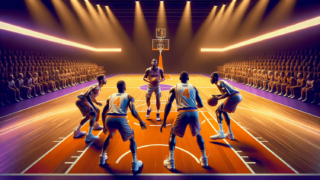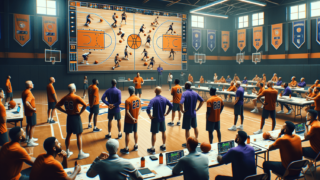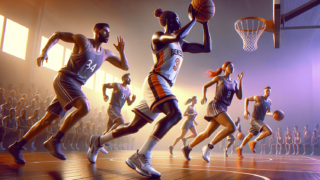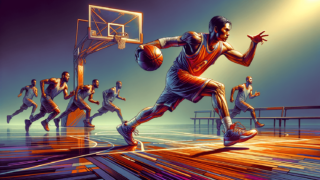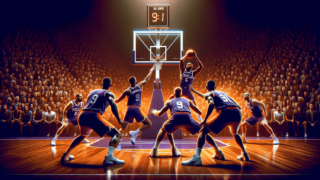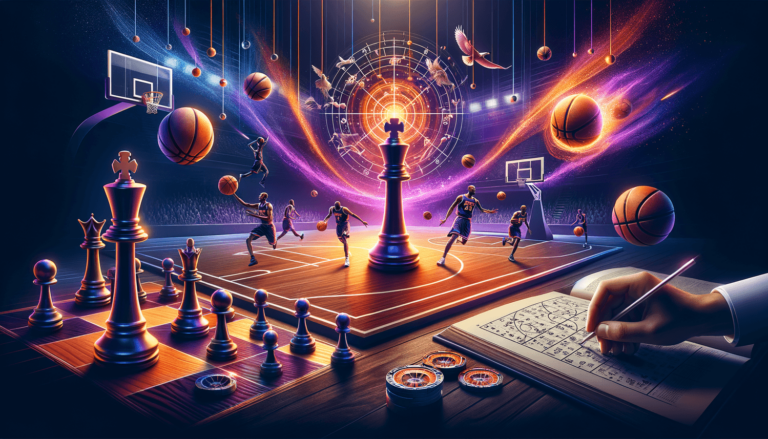
Are you eager to elevate your game from a mere hobby to an unstoppable force on the court? Then sharpening your basketball IQ is crucial! This includes not only the physical aspects of basketball, but an innate understanding of its strategic and tactical depths. In this exciting and informative blog post, we will explore various methods and tips to help you gain the knowledge and insights necessary to level up your skills and become a true court general. Get ready to blow your teammates’, opponents’, and coaches’ minds as you dive into the world of basketball intelligence and transform your game from ordinary to extraordinary!
How to Develop a Basketball IQ?
Developing a high basketball IQ involves a variety of steps such as studying the game, playing regularly, watching and analyzing professional games, learning from experienced players and coaches, and focusing on both offensive and defensive strategies. It’s essential to continually improve your understanding of basketball fundamentals, situational analysis, and decision-making, in order to make smart plays and stay ahead of the competition on the court.
Immerse Yourself in the Game
The first step to develop a high basketball IQ is immersing yourself in the beautiful world of basketball. This means watching games, practicing different basketball drills, engaging with other players, and reading about the sport. The more exposed you are to basketball, the more you’ll be able to absorb critical knowledge and insights that contribute to a higher basketball IQ.
Watch and Analyze Basketball Games
Watching basketball games is not only entertaining but also educational. Observing professional players, taking note of their plays, and understanding their decision-making processes can provide you with valuable insights. Don’t just watch a game for the highlight plays, analyze it by identifying strategies, strengths, and weaknesses of each team. Pay attention to offensive and defensive patterns and try to recognize which plays work most efficiently for various game situations.
Ask Questions and Learn From Experienced Individuals
Getting advice, tips, and tricks from experienced players or coaches can help improve your basketball IQ. Don’t be shy to ask questions, as learning from their wisdom can fast-track your development. You can learn how to read different game situations, make adjustments, and decide the best course of action in real-time.
Understand Basketball Fundamentals
In order to build a strong foundation for your basketball IQ, it’s crucial to understand the fundamentals of the game. Having a solid grasp of basic skills, such as passing, shooting, dribbling, or defense, will help you make better decisions and execute plays more effectively.
Offensive Fundamentals
At the core of the offensive game are shooting, passing, and dribbling. Mastering these skills will enable you to become a versatile and effective player on the court. Good shooters take high-percentage shots based on their skill set and the defensive pressure they face. A great passer can make sharp decisions and deliver accurate passes, setting up teammates for easy buckets. An adept dribbler has control of the ball and can create scoring opportunities for themselves or their teammates.
Defensive Fundamentals
Defensive fundamentals include positioning, footwork, and communication. It’s essential to maintain a proper stance, execute defensive slides, and use your hands effectively to contest or deflect passes and shots. Good communication with your teammates is crucial for team defense, as it helps to coordinate efforts to stop the opposing team’s offensive threats.
Master Offensive and Defensive Strategies
One vital aspect of developing a high basketball IQ is understanding offensive and defensive strategies. Being familiar with different plays and being able to execute them will allow you to exploit weaknesses in the opposing team’s defense and adjust your tactics to counter their offensive attack.
Offensive Strategies
Learn different offensive plays and how to apply them in a game. Focus on the following aspects:
- Ball movement and spacing
- Pick and roll
- Transition offense
- Off-ball screens
- Isolation plays
The key is to recognize the appropriate play to implement based on your teammates’ strengths, the opponent’s weaknesses, and the game situation.
Defensive Strategies
Grasp principles of various defensive tactics, such as:
- Man-to-man defense
- Zone defense
- Half and full-court presses
- Switching and hedging on pick and rolls
Being well-versed in defensive strategies will enable you to adapt to different opponents and neutralize their offensive threats, ultimately contributing to your team’s success.
Develop Your Basketball Vocabulary
Understanding basketball terminology and jargon will allow you to communicate more effectively with your teammates and coaches. Knowing the right terms can also help you absorb new information and tactics more efficiently. Some essential terms include:
- Pick and roll
- Giving and go
- Box out
- Fast break
- Crossover
The more comprehensive your basketball vocabulary, the easier it’ll be to understand and analyze game situations and contribute to the conversation both on and off the court.
Learn to Read the Game
Reading the game is an essential skill for players with high basketball IQ. This means recognizing patterns, predicting opponents’ actions, and making adjustments in real-time. Watching the shot clock, understanding player and team tendencies, and paying attention to the state of the game are helpful in accomplishing this.
Analyze Your Opponents
Before each game, learn about your opponents by studying their strengths and weaknesses. Doing so will enable you to anticipate their next move and devise strategies to counter it. Be prepared to adjust your approach during the game as opponents can surprise you with new tactics or hidden skills.
Recognize and Exploit Mismatches
One way to gain an advantage in basketball is by exploiting mismatches. This is when your team has a player who is better suited to take advantage of their defender’s weaknesses, such as a significant height or speed difference. By identifying these mismatches, you can design plays to capitalize on them, increasing your team’s chances of scoring.
Adapt to Game Situations
Game situations can change rapidly, and the ability to adapt is critical for a player with high basketball IQ. Be mindful of foul trouble, substitutions, and shifts in momentum. Knowing when to push the pace, slow it down, or call a timeout could be the difference between winning and losing.
Improve Decision-Making and Critical Thinking
Decision-making is a crucial part of developing a high basketball IQ. Good decision-makers are able to analyze various game situations and determine the best course of action in a split second. This involves weighing the potential risks and rewards of each choice and selecting the option with the highest probability of success.
Practice Quick Decision-Making
When practicing, simulate game situations that require quick decision-making. Put yourself under pressure and work on making smart decisions while maintaining composure. Over time, your decision-making skills will improve, and you’ll be better equipped to handle high-pressure situations during a game.
Reflect on Past Game Situations
Reviewing and reflecting on past game situations can help you identify areas for improvement in decision-making. Look for trends in your past choices and analyze the outcomes. Use this information to make better decisions in future games and practice situations.
Apply What You’ve Learned
The final and most crucial step in developing your basketball IQ is applying what you’ve learned. Knowledge without execution is futile, so be diligent in implementing the strategies, tactics, and techniques you’ve acquired. It takes time and dedication, but with consistent effort and a strong desire to excel, your basketball IQ will steadily increase.
Remember that developing a high basketball IQ is an ongoing process. It requires patience, dedication, and a constant thirst for knowledge. By following these guidelines and committing yourself to continual improvement, you will maximize your potential and become the intelligent, versatile, and skilled basketball player you’ve always aspired to be.
Enhance Your Physical and Mental Fitness
A player with a high basketball IQ also possesses a strong physical and mental fitness foundation. Staying physically fit will allow you to execute the strategies and tactics you’ve learned effectively. In addition, mental fitness is crucial for maintaining focus, handling pressure, and making split-second decisions on the court.
Physical Fitness
Keep your physical fitness at an optimal level by incorporating strength training, cardiovascular workouts, and agility drills into your exercise routine. Proper nutrition is also essential, as it provides the necessary fuel for your body to perform at its best during games and practices. Be sure to get adequate rest and recovery, as this ensures you are always ready to perform at your peak.
Mental Fitness
Develop mental fitness by practicing mindfulness, focusing on positive self-talk, and setting realistic goals. Try visualization techniques to rehearse game scenarios in your mind, enabling you to react more quickly and effectively during games. It’s also important to build resilience, learn from your mistakes, and bounce back from setbacks.
Study the Greats
Gain valuable insights and inspiration by studying the great basketball players who possessed high basketball IQs. Analyze their in-game decisions, court vision, and overall basketball knowledge to expand your understanding of the game. Some great examples include:
- Michael Jordan
- LeBron James
- Magic Johnson
- Larry Bird
- Tim Duncan
Learn not only from their incredible skill sets but also from their approach to the game, leadership qualities, and ability to handle high-pressure situations.
Participate in Basketball Camps and Clinics
Attending basketball camps and clinics is a great way to enhance your basketball IQ. These events often feature experienced coaches and players who can provide valuable insights, training drills, and strategies to help you elevate your game. In addition, camps and clinics often provide opportunities to scrimmage and compete against other participants, allowing you to apply what you’ve learned in real-game situations.
Establish a Pre-Game Routine
Developing a consistent pre-game routine can help you prepare mentally and physically for each game, improving your overall basketball IQ. This routine can include a proper warm-up, mental preparation, reviewing strategies, and visualizing success during the game. Implementing a solid pre-game routine will ensure that you are ready to perform at your best each time you step on the court.
Be Coachable
Being receptive to feedback and advice from your coaches is imperative when developing your basketball IQ. Coaches possess a wealth of knowledge and experience that can help you identify areas for improvement and hone your skills. Being open to new ideas and perspectives will enable you to grow as a player and attain a higher basketball IQ.
In conclusion, developing a high basketball IQ involves a multifaceted approach, which includes learning about the game, mastering fundamentals, honing decision-making skills, and being physically and mentally fit, among other factors. By dedicating time and effort to each of these aspects, you will be well on your way to becoming a smart, skilled, and versatile basketball player.
Frequently Asked Questions
We understand that there may be some questions you still have about developing a high basketball IQ. In this FAQ section, we answer ten common questions related to building basketball intelligence, providing concise, helpful responses to assist you on your journey to becoming the smartest player on the court.
1. How long does it take to develop a high basketball IQ?
Developing a high basketball IQ is an ongoing process and the time it takes can vary for each individual. It requires consistent effort, willingness to learn, and a dedication to improvement. The more you practice, watch games, and learn from experienced players and coaches, the more quickly you’ll see progress.
2. Can you develop a high basketball IQ without playing in an organized team setting?
Yes, you can work on raising your basketball IQ even without being part of an organized team. However, participating in an organized setting provides valuable opportunities to apply your knowledge in real-game situations and learn from coaches and teammates, which could fast-track your development.
3. How do I improve my decision-making skills on the court?
To improve your decision-making skills, practice making quick decisions in simulated game situations, review and reflect on past game scenarios, and analyze professional players’ decision-making processes. Over time, you’ll become more adept at handling pressure and making smart choices during games.
4. Can watching basketball games alone significantly improve my basketball IQ?
While watching games can provide valuable insights, developing a high basketball IQ requires a multifaceted approach. Immersing yourself further by playing, participating in camps and clinics, learning from experienced players, and understanding offensive and defensive strategies will offer a more comprehensive and effective way to improve your basketball IQ.
5. Can players of any age develop a high basketball IQ?
Yes, players of any age can work on building their basketball IQ. Just as with any skill, the earlier a person starts, the better their chances of mastery. However, no matter your age, you can always improve your basketball intelligence through dedication, practice, and a willingness to learn.
6. What are some key indicators of a player with a high basketball IQ?
A player with a high basketball IQ exhibits excellent decision-making, anticipation of opponents’ actions, adaptability to game situations, and a deep understanding of offensive and defensive strategies. They communicate effectively, possess strong fundamentals, and have the ability to make their teammates better.
7. How can I improve my ability to read game situations and opponents during a game?
Improving your ability to read game situations and opponents involves watching game footage, analyzing strengths and weaknesses, paying attention to patterns and tendencies, and studying opposing players. Experience and exposure to different game situations will enhance your ability to make rapid adjustments and anticipate opponents’ actions.
8. Can I develop a high basketball IQ without being physically gifted or skilled?
While physical ability can play a role in demonstrating a high basketball IQ, it isn’t a prerequisite. Players with excellent understanding and decision-making skills can still have a significant impact on the game without relying on exceptional physical attributes. However, a solid foundation in basketball fundamentals and physical fitness can enhance the effectiveness of your basketball IQ on the court.
9. What should I focus on first to develop a high basketball IQ?
Start by building a strong foundation of basketball fundamentals and immerse yourself in the game by watching and analyzing basketball games. Once you have a good understanding of the basics, work on improving your decision-making skills, learning offensive and defensive strategies, and studying experienced players and coaches.
10. How important are pre-game routines in developing a high basketball IQ?
Pre-game routines are vital for preparing mentally and physically for each game. A consistent routine can help improve focus, enhance performance, and ensure that you enter each game ready to apply your basketball IQ effectively. Incorporate elements such as proper warm-ups, mental preparation, and reviewing strategies into your pre-game routine.
Featured Posts
- No pillar pages found.
